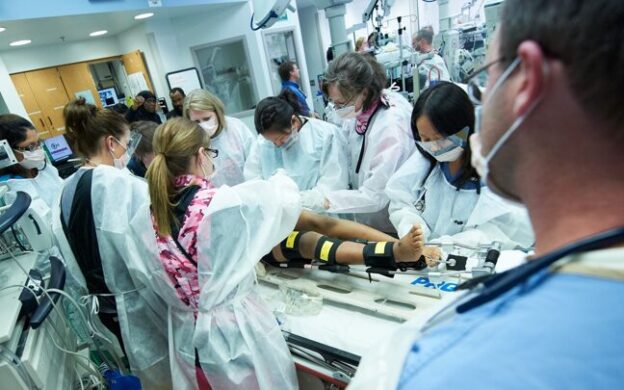Lee Daugherty Biddison, MD, MPH is associate professor of medicine in the Johns Hopkins Division of Pulmonary and Critical Care Medicine and chief wellness officer for Johns Hopkins Medicine. She is associate faculty in the Johns Hopkins Armstrong Institute for Patient Safety and Quality and a contributing scholar in the Johns Hopkins Center for Health Security. Dr. Biddison’s research interests include hospital operations, patient safety, critical care disaster response and physician well-being.
As Executive Director for nursing well-being for the Johns Hopkins Healthcare System, Carolyn Cumpsty-Fowler, PhD provides strategic leadership for system- and entity-level initiatives to foster a positive practice environment that supports inter-professional well-being and professional fulfillment. Following training in nursing, midwifery and community health, Dr. Fowler worked clinically and in research while earning a PhD from the University of Cape Town for which she received the Faculty of Health Sciences doctoral research prize. She then returned to the USA for a postdoctoral fellowship in health policy and management as well as an MPH at Johns Hopkins Bloomberg School of Public Health. Carolyn has had several roles at the Johns Hopkins Bloomberg School of Public Health and School of Nursing, as well as at the Baltimore County Department of Health.
Learning Objectives:
- Describe the importance of prioritizing workplace well-being
- Understand the rationale for an interprofessional approach to promoting clinician well-being
- Discuss the role of leaders in shaping organizational priorities and culture to enhance well-being
Speakers:
- Lee Daugherty Biddison, MD, MPH
- Carolyn Cumpsty-Fowler, PhD
This seminar was delivered as a Pediatric Grand Rounds Lecture at Children’s Hospital of Philadelphia, on December 18, 2024.
Content Disclaimer
The Terms of Use and Privacy Policy set forth on the website of The Children’s Hospital of Philadelphia apply to any and all uses of and access to this site and the content found here.
The work presented in the presentations, videos, and other content on this site (“Presentations”) includes publicly available medical evidence, a consensus of medical practitioners, and/or opinions of individual practitioners that may differ from consensus opinions. These Presentations are intended only to provide general information and need to be adapted for each specific patient based on the practitioner’s professional judgment, consideration of any unique circumstances, the needs of each patient and their family, the availability of various resources at the health care institution where the patient is located, and other factors. The Presentations are not intended to constitute medical advice or treatment, nor should they be relied upon as such. The Presentations are not intended to create a doctor-patient relationship between/among The Children’s Hospital of Philadelphia, its physicians and the individual patients in question. The information contained in these Presentations are general in nature, and do not and are not intended to refer to specific patients.
CHOP, The Children’s Hospital of Philadelphia Foundation and its or their affiliates, the authors, presenters, practitioners, editors, and others associated with the creation of the Presentations (“CHOP”) are not responsible for errors or omissions in the Presentations; for any outcomes a patient might experience where a clinician reviewed one or more such Presentations in connection with providing care for that patient; and/or for any and all third party content on the site or in the Presentations. CHOP makes no warranty, expressed or implied, with respect to the currency, completeness, applicability or accuracy of the Presentations. Application of the information in or to a particular situation remains the professional responsibility of the practitioner who is directly treating the patient.
To the extent that the Presentations include information regarding drug dosing, in view of ongoing research, changes in government regulations and the constant flow of information relating to drug therapy and drug reactions, the viewer should not rely on the Presentation content, but rather is urged to check the package insert for each drug for indications, dosage, warnings and precautions.
Some drugs and medical devices presented in the Presentations have United States Food and Drug Administration (FDA) clearance for limited use in restricted research settings. It is the responsibility of the practitioner to ascertain the FDA status of each drug or device planned for use in their clinical practice.
You shall indemnify, defend and hold harmless CHOP, The Children’s Hospital of Philadelphia Foundation, and its/their current and former employees, officers, and agents, trustees, and their respective successors, heirs and assigns (“Indemnitees”) against any claims, liability, damage, loss or expenses (including attorneys’ fees and expenses of litigation) in connection with any claims, suits, actions, demands or judgments arising directly or indirectly out of your reference to or use of the Presentations.
The Presentations are protected by copyright laws and in some cases patent laws, and all rights are reserved under such laws. No part of the Presentations may be reproduced in any form by any means, or utilized in any other way, absent prior written permission from the copyright owner.
By starting this module, you agree to our Content Disclaimer and Terms of Service.
